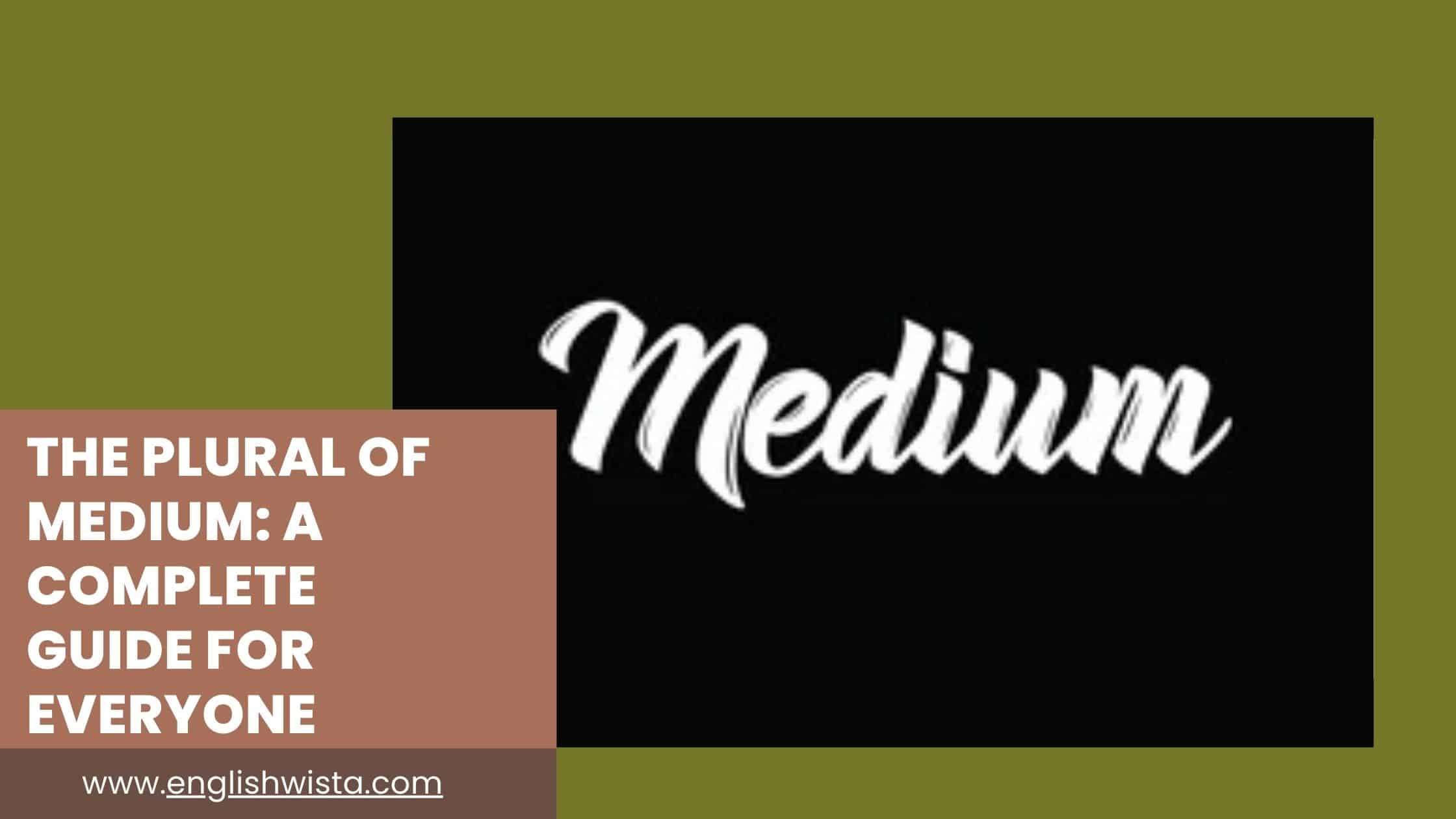Have you ever stopped mid-sentence, unsure whether to say mediums or media? You’re not alone. The word medium can be surprisingly tricky when it comes to plural forms. At first glance, it looks like an ordinary English word that should just take an s at the end. But then, you hear people on the news talking about “the media,” and suddenly you’re second-guessing everything.
Don’t worry we’re going to break it all down step by step. In this article, we’ll explore the plural of medium, why it has more than one form, and how to know which one to use. By the end, you’ll feel confident using this word in everyday conversation, writing, or even in a professional setting. Let’s dive in.
What Does Medium Mean?
Before we talk about plurals, let’s get clear on what the word medium actually means.
At its core, a medium is a way, method, or channel through which something is expressed or communicated. But it has multiple meanings depending on the context. Here are the most common ones:
- Communication: A medium is a tool for sharing information. For example, television, radio, and the internet are all communication mediums.
- Art: In art, a medium refers to the material an artist uses, like oil paints, clay, or watercolor.
- Spirituality: A medium can also mean a person who claims to communicate with spirits.
- General use: Sometimes, it simply refers to a middle point or size, like a “medium T-shirt.”
So, medium is a flexible word with several uses. And because it appears in different contexts, the plural form can also change.
What Is the Plural of Medium?
Here comes the key part: the plural of medium can be media or mediums, depending on the meaning and the situation.
- When talking about communication tools (like newspapers, television, or social media), the plural is usually media.
- When talking about art materials or spiritual workers, the plural is more often mediums.
So the correct plural depends on the context. That’s why it sometimes feels confusing you might hear both versions in different places.
Why Are There Two Plurals?
Great question! The answer lies in the origin of the word.
The word medium comes from Latin. In Latin, many words ending in -um form their plural with -a. For example:
- datum → data
- bacterium → bacteria
- curriculum → curricula
Following this same rule, medium becomes media.
But English often develops its own patterns over time. In modern English, adding an s to make plurals is the usual way. So, medium also has the plural mediums especially when referring to people or artistic methods.
That’s why both forms are considered correct today. It just depends on what you’re talking about.
Is Media Singular or Plural?
This is where things get even more interesting. Technically, in Latin, media is plural. The singular is medium. But in everyday English, people often treat media as a singular collective noun.
For example:
- Traditional usage: “The media are reporting the story.” (treating media as plural)
- Modern usage: “The media is covering the story.” (treating media as singular)
Both versions are widely accepted today. In formal writing, you might see media treated as plural, but in casual speech, most people use it as singular.
So, if you’ve ever wondered which is correct the answer is both, depending on style and context.
When to Use Mediums vs. Media
To keep things simple, here’s a quick guide:
- Use media when you’re talking about mass communication or broadcasting.
- Example: “Social media is a powerful tool for connecting with people.”
- Example: “The media have reported extensively on the issue.”
- Use mediums when you’re talking about art or spiritual practices.
- Example: “The artist works with several mediums, including watercolor and acrylic.”
- Example: “Some people visit spiritual mediums for guidance.”
This distinction makes your writing and speaking clearer and more precise.
Real-Life Examples of Medium, Media, and Mediums
Let’s go through some examples to see how these forms appear in everyday use.
- Communication
- Correct: “Television and radio are popular media.”
- Correct: “Social media has changed how we communicate.”
- Art
- Correct: “Oil paint and charcoal are the artist’s favorite mediums.”
- Correct: “The museum displayed works created in many different mediums.”
- Spirituality
- Correct: “The town is known for its psychic mediums.”
- Correct: “Several mediums gathered for the annual spiritual fair.”
- General usage (size or middle state)
- Correct: “I’ll take a medium coffee, please.”
- Note: In this sense, medium usually doesn’t need a plural, unless you’re ordering several.
- Example: “We bought three mediums and two larges.”
By practicing with examples, you’ll get a stronger sense of when to use media and when to use mediums.
Fun Facts About Medium and Media
Here are some extra bits of trivia to keep things interesting:
- The word media has taken on a life of its own in English. Today, when people say “the media,” they almost always mean newspapers, TV, or online platforms not just the plural of medium.
- In computer science, the term storage media refers to things like hard drives, CDs, or USB sticks. Here, media is always used, never mediums.
- The word medium also means “in the middle.” That’s why we say “medium rare” for steak, or “medium size” for clothes.
- In statistics, median (a related word) refers to the middle value in a set of numbers. Both words share the idea of being in the middle.
Common Mistakes to Avoid
Since this word can be confusing, here are some mistakes to watch out for:
- Using mediums when you mean media
- Wrong: “Social mediums are growing quickly.”
- Right: “Social media is growing quickly.”
- Forgetting that media can be singular or plural
- Wrong: “The media are covering it, and it is covering it too.” (awkward mix)
- Better: Stick to one choice either singular or plural for clarity.
- Overthinking it
- Remember, both mediums and media are correct in English. The key is knowing the context.
Quick Recap for Easy Memory
Here’s a simple way to remember:
- Media = communication tools (news, TV, internet).
- Mediums = art materials or spiritual workers.
If you stick to this rule of thumb, you’ll rarely go wrong.
Conclusion
So, what’s the plural of medium? The short answer is: it can be media or mediums, depending on the context.
- Use media when talking about mass communication or storage.
- Use mediums when referring to art materials or spiritual workers.
- Remember that media can act as both singular and plural in English today.
Now, the next time you hear someone mention “the media” or read about an artist working in “different mediums,” you’ll know exactly why both forms exist and how to use them correctly.
Language can feel tricky sometimes, but once you break it down, it’s not so bad. And with medium, you’ve got a word that’s not only useful but also a little fun to explore.
So, next time you order a “medium pizza” or scroll through “social media,” you can smile, knowing you’ve mastered the plural puzzle of this fascinating word.



